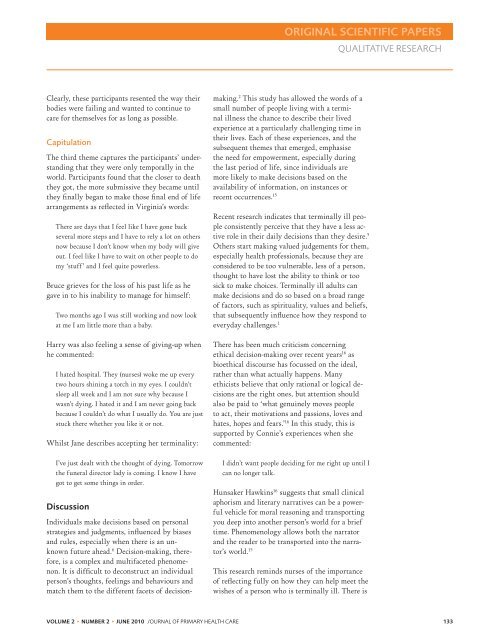entire issue - The Royal New Zealand College of General Practitioners
entire issue - The Royal New Zealand College of General Practitioners
entire issue - The Royal New Zealand College of General Practitioners
Create successful ePaper yourself
Turn your PDF publications into a flip-book with our unique Google optimized e-Paper software.
ORIGINAL SCIENTIFIC PAPErS<br />
quaLitative research<br />
Clearly, these participants resented the way their<br />
bodies were failing and wanted to continue to<br />
care for themselves for as long as possible.<br />
Capitulation<br />
<strong>The</strong> third theme captures the participants’ understanding<br />
that they were only temporally in the<br />
world. Participants found that the closer to death<br />
they got, the more submissive they became until<br />
they finally began to make those final end <strong>of</strong> life<br />
arrangements as reflected in Virginia’s words:<br />
<strong>The</strong>re are days that I feel like I have gone back<br />
several more steps and I have to rely a lot on others<br />
now because I don’t know when my body will give<br />
out. I feel like I have to wait on other people to do<br />
my ‘stuff’ and I feel quite powerless.<br />
Bruce grieves for the loss <strong>of</strong> his past life as he<br />
gave in to his inability to manage for himself:<br />
Two months ago I was still working and now look<br />
at me I am little more than a baby.<br />
Harry was also feeling a sense <strong>of</strong> giving-up when<br />
he commented:<br />
I hated hospital. <strong>The</strong>y (nurses) woke me up every<br />
two hours shining a torch in my eyes. I couldn’t<br />
sleep all week and I am not sure why because I<br />
wasn’t dying. I hated it and I am never going back<br />
because I couldn’t do what I usually do. You are just<br />
stuck there whether you like it or not.<br />
Whilst Jane describes accepting her terminality:<br />
I’ve just dealt with the thought <strong>of</strong> dying. Tomorrow<br />
the funeral director lady is coming. I know I have<br />
got to get some things in order.<br />
Discussion<br />
Individuals make decisions based on personal<br />
strategies and judgments, influenced by biases<br />
and rules, especially when there is an unknown<br />
future ahead. 6 Decision-making, therefore,<br />
is a complex and multifaceted phenomenon.<br />
It is difficult to deconstruct an individual<br />
person’s thoughts, feelings and behaviours and<br />
match them to the different facets <strong>of</strong> decisionmaking.<br />
2 This study has allowed the words <strong>of</strong> a<br />
small number <strong>of</strong> people living with a terminal<br />
illness the chance to describe their lived<br />
experience at a particularly challenging time in<br />
their lives. Each <strong>of</strong> these experiences, and the<br />
subsequent themes that emerged, emphasise<br />
the need for empowerment, especially during<br />
the last period <strong>of</strong> life, since individuals are<br />
more likely to make decisions based on the<br />
availability <strong>of</strong> information, on instances or<br />
recent occurrences. 15<br />
Recent research indicates that terminally ill people<br />
consistently perceive that they have a less active<br />
role in their daily decisions than they desire. 5<br />
Others start making valued judgements for them,<br />
especially health pr<strong>of</strong>essionals, because they are<br />
considered to be too vulnerable, less <strong>of</strong> a person,<br />
thought to have lost the ability to think or too<br />
sick to make choices. Terminally ill adults can<br />
make decisions and do so based on a broad range<br />
<strong>of</strong> factors, such as spirituality, values and beliefs,<br />
that subsequently influence how they respond to<br />
everyday challenges. 1<br />
<strong>The</strong>re has been much criticism concerning<br />
ethical decision-making over recent years 16 as<br />
bioethical discourse has focussed on the ideal,<br />
rather than what actually happens. Many<br />
ethicists believe that only rational or logical decisions<br />
are the right ones, but attention should<br />
also be paid to ‘what genuinely moves people<br />
to act, their motivations and passions, loves and<br />
hates, hopes and fears.’ 16 In this study, this is<br />
supported by Connie’s experiences when she<br />
commented:<br />
I didn’t want people deciding for me right up until I<br />
can no longer talk.<br />
Hunsaker Hawkins 16 suggests that small clinical<br />
aphorism and literary narratives can be a powerful<br />
vehicle for moral reasoning and transporting<br />
you deep into another person’s world for a brief<br />
time. Phenomenology allows both the narrator<br />
and the reader to be transported into the narrator’s<br />
world. 15<br />
This research reminds nurses <strong>of</strong> the importance<br />
<strong>of</strong> reflecting fully on how they can help meet the<br />
wishes <strong>of</strong> a person who is terminally ill. <strong>The</strong>re is<br />
VOLUME 2 • NUMBER 2 • JUNE 2010 J OURNAL OF PRIMARY HEALTH CARE 133

















